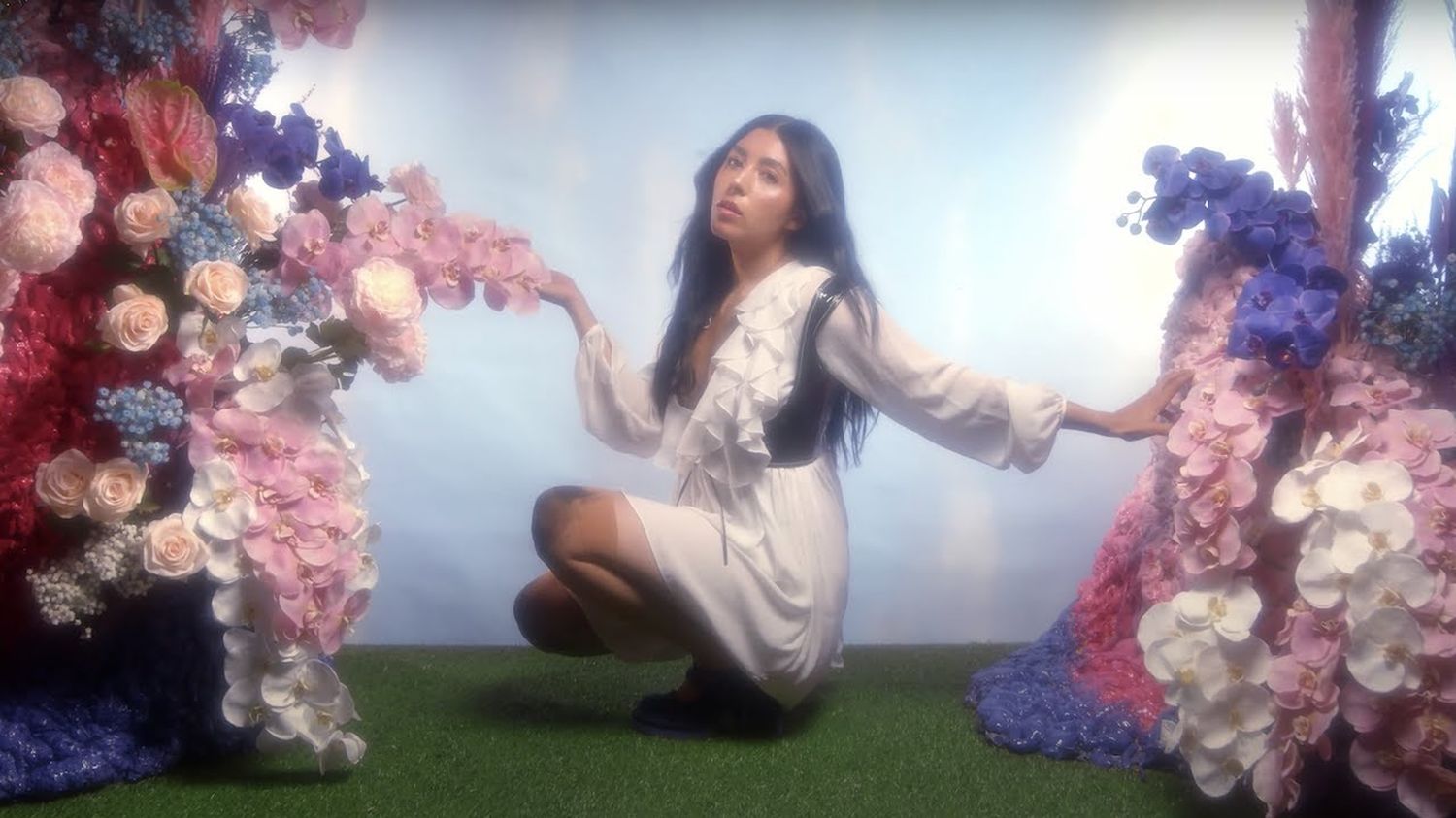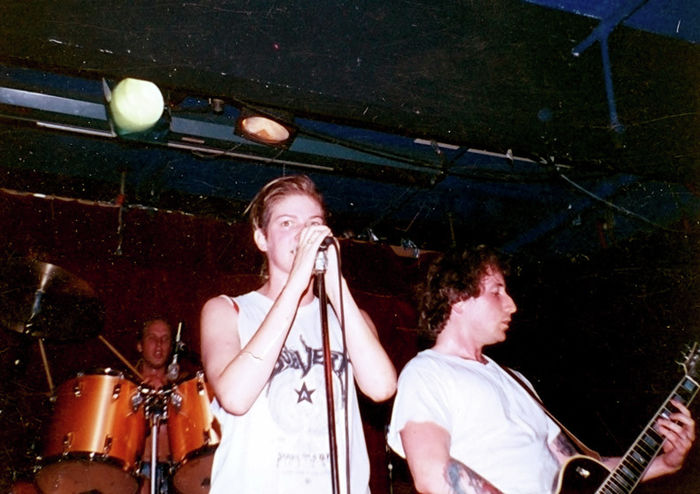Pop-punk has been slowly making its way back into the mainstream, with changes reflecting the evolution of the music industry since it was at its peak in the mid-2000s. Most notably, the genre is more diverse and representative than ever before, with performers such as WILLOW and Meet Me @ The Altar taking centre stage. For so many young people, myself included, it feels so special to see the genre no longer dominated by cisgender, heteronormative white men. It is inexplicably touching to hear a voice like your own being carried through the music you love.
Under the bleachers: The background of Pom Pom Squad
However, among these rising stars, none bring a performance as unique as Pom Pom Squad, the project fronted by the exceptionally talented, yet equally humble Mia Berrin. My first question for her is about the thought process behind her intelligently crafted musical persona. She starts off by giving me some background to the project: “I think my fixation on cheerleaders specifically started when I was in high school. I grew up partially in Orlando, Florida. It feels Lynchean in the way that it looks - everything is very manicured, very pretty, very clean, very white.”
As a coping mechanism for the bullying and difficulties she faced in high school, Mia tells me she “became very obsessed with documentation and character.” She explains what the image of the cheerleader means to her: “The cheerleader is, as a concept, really representative of a ‘girlhood’ or American existence that I didn’t ever feel like I could have. What I saw, and all the positive associations of the cheerleader, it just felt like a girl I could never be. Beautiful, desirable, strong. Popular, interesting, whatever.” Mia, as a queer Afro-Latina woman, claims this image, one that is so strongly associated with traditionally white American girlhood, for herself and young women like her. Completely defying the Americana-rooted stereotype of the cheerleader image, while also defying the expectation of what a woman in rock should look like, she creates a character where these seemingly incongruous elements blend so naturally.
"I related to the anger that she felt and the resentment that she felt"
Reflecting on the little representation there was for her in her teenage years, Mia talks to me about the ‘riot grrl’ movement. “Seeing people who are not cis straight men making that kind of music was a revelation. Especially for me, I’ve always been a very femme person, I identify as a cis woman and I like feminine aesthetics.” She does state that she “never saw another femme brown person in a grunge or punk band at the time”, but she cites Courtney Love as her main source of representation during her teenage years: “I related to the anger that she felt and the resentment that she felt and the way she chose to dress, and so that became my representation.”
Shedding a forced persona: Death of a Cheerleader
Death of a Cheerleader, Pom Pom Squad’s debut LP, is one of 2021’s most remarkable musical experiences. Weaving traditional pop-punk on ‘Head Cheerleader’ with unconventional slow songs such as ‘Second That’ and ‘Again’, the album presents a path of ever-shifting sounds that is at once volatile and cohesive. Mia’s overarching coming-of-age narrative feels at once fantastical and relatable, which she attributes to its grounding in her ‘coming out’ story. “When I was growing up, I always knew that being gay is fine, but for some reason I still held this expectation that I could not be gay, that there was something wrong with me being gay,” she tells me. To her, the metaphorical Death of a Cheerleader “represented a shedding of things”, particularly a shedding of this forced persona.
"It just feels like one of those rare artistic experiences where I feel like I got out of it what I wanted to"
She explains that “the cheerleader represented at times, a life I lived for other people, this expectation of femininity or the lifestyle that was never gonna be my lifestyle, marrying a man or living my life as a “straight person”.” Even the album cover depicts a burial under what she describes as a “pretty prison”. Lyrically, listeners are taken on the up-and-down, back-and-forth journey that comes with falling in love for the first time, which comes with all the expected vivacity and emotional tumult, but ends on the surprisingly gentle ‘Be Good’, which Mia claims as her favourite. “That was the song that really unlocked the rest of the album for me, and it just feels like one of those rare artistic experiences where I feel like I got out of it what I wanted to. I wouldn’t really change anything about it.”
The necessity of adult emotionality
Talking about the concept of ‘coming-of-age’, Mia reveals the thought process behind the brief, yet dynamic ‘Lux’, named after the character from ‘The Virgin Suicides’: “it was about using Lux’s character to explore my first experiences of sexuality and male gaze and all those fun things that you start to feel when you’re sixteen or seventeen”. I was simultaneously shocked and impressed when she declared that she had started writing songs for the album, with ‘Lux’ being the first, from the age of sixteen. When I commented on how this was perhaps why the album felt so authentically ‘adolescent’ to me, Mia was, rightly, quick to correct me: “I think at a certain point they’re just feelings that you go through, not only as an adolescent, but as a person who is starting to have realisations about the world. I think I’m going to be coming-of-age for the rest of my life and it’s just what age you’re coming into.”
Reminding me of the public treatment of artists like Taylor Swift, Mia admits that some of her critics have used the fact that her music is infused with strong emotion to discredit or minimise her artistry, relegating it to ‘teenageness’. To use her words, there seems to be this societal “association that adulthood means you have to close yourself off to a certain level of emotionality”. She says that being so connected to her teenage self at twenty-four has caused some existential crises, yet Pom Pom Squad’s work feels like the perfect bridge for young adults to tap into that intense, thunderous emotion that we’re being taught to shut out. After hearing me say this, she tells me she’s glad that her music allows people to connect with that level of emotion.
The future of Pom Pom Squad
Like many other artists, the pandemic severely inhibited Mia’s ability to perform, one of the aspects of her artistry in which she is most confident, revelling in her ability to constantly subvert the expectations of unknowing audience members. Mia tells me she is working hard to ensure that she can deliver the best performance possible for her second tour and is enthusiastic to play some of the more orchestral music live.
Realising that I’m perhaps keeping her for a bit longer than she’d signed up for, I thank Mia for her time and wrap up the interview. Meeting the humble, eloquent and honest person behind one of my favourite projects of 2021 was an absolute pleasure and honour. But even more, hearing from Mia how personally-driven and meticulous the whole project is really reminded me just why it is so exceptional. Pom Pom Squad is not only an up-and-coming artist to watch over the next year, but an artist that is essential in bringing the beloved genre of pop-punk into 2022. Mia Berrin bears the spirit and voice that young people like myself have waited years to see on a platform - and it’s safe to say that she does not disappoint.



